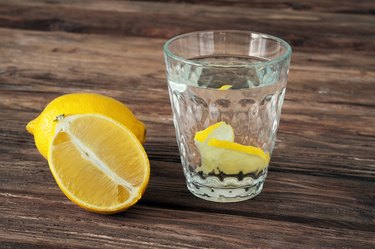
Eating salty foods, such as luncheon meat, olives, chips or canned soup, can cause you to retain water. Though this excess fluid weight is most likely temporary, it can make you feel uncomfortable, or as if you've put on a few pounds. Ideally, you should avoid salty foods to prevent fluid retention. However, you can remedy the problem after the fact.
Step 1
Move your body to help flush excess fluid retention. Go for a jog, ride a bike or work out on an elliptical trainer. Exercise not only helps circulation, but it increases sweating which will promote release of fluids through the skin. If the bloating occurs right after a large meal, go for a walk around your neighborhood; avoid vigorous exercise, which can cause cramps on a full stomach.
Video of the Day
Step 2
Drink a glass of water mixed with fresh lemon juice to reduce bloating. The Better Health Channel reports that drinking more water will keep you hydrated, which makes your body less like to retain water and helps your kidneys flush out excess fluid.
Step 3
Eat foods high in potassium. Potassium helps your body regulate fluids -- this is helpful when you're retaining too much water. A study in the July 2011 issue of "Archives of Internal Medicine" reports that consuming too much sodium and too little potassium increases your risk of heart disease and death. Foods rich in potassium, but low in sodium, are white beans, leafy greens, plain yogurt, salmon, broccoli, cantaloupe, citrus fruits, bananas and blackberries.
Step 4
Avoid foods high in sugar, white flour and sodium. They tend to cause fluid retention, which will hinder your attempts to lose fluid weight.
Things You'll Need
Running shoes
Bicycle
Elliptical trainer
Tea
Coffee
Glass
Water
Lemon
Oranges
Bananas
Apples
Video of the Day
- Fat Burning Foods: An A-Z list of Foods that Burn Fat to Start a Healthy Diet; C. Elias
- Better Health Channel: Fluid Retention
- Archives of Internal Medicine: Sodium and Potassium Intake and Mortality Among US Adults: Prospective Data From the Third National Health and Nutrition Examination Survey
- Harvard School of Public Health: Shifting the Balance of Sodium and Potassium in Your Diet